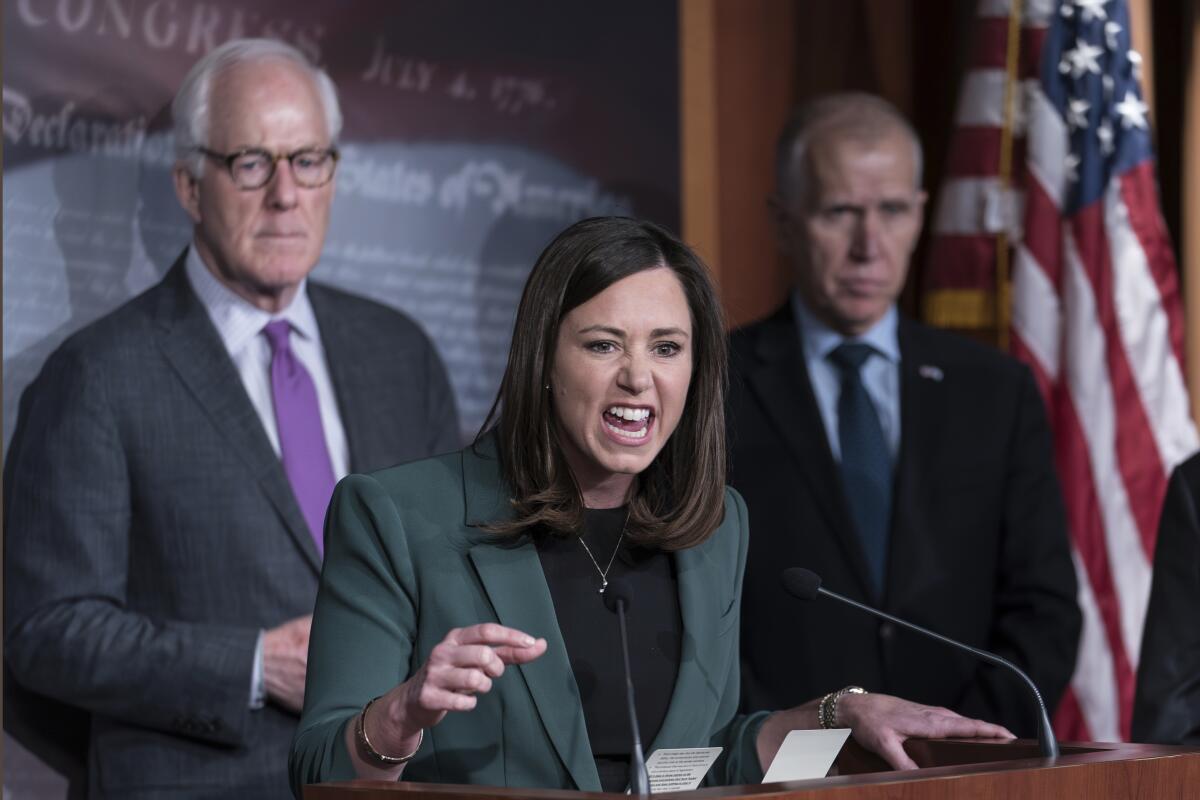Column: Republican senators’ blocking aid to Ukraine is next-level cynicism

- Share via
Only five months ago, President Biden promised at a NATO summit that the United States and its allies would help defend Ukraine against Russia’s wanton aggression for “as long as it takes.” Just after Vladimir Putin’s invasion, and amid his soldiers’ ongoing war crimes, former Vice President Mike Pence promised a roomful of Republican donors, “There is no room in this party for apologists for Putin.”
Promises made, promises broken.
Neither Biden nor Pence figured on the inconstancy and political cynicism of Republicans in Congress. And now the party — under the sway of Donald Trump’s dictator-coddling isolationism and looking for electoral advantage — has conditioned its support for aid to Ukraine on solving our domestic immigration problem, an issue that has defied bipartisan solutions for nearly 40 years, under presidents of both parties.
Opinion Columnist
Jackie Calmes
Jackie Calmes brings a critical eye to the national political scene. She has decades of experience covering the White House and Congress.
Worse, especially in the House, many Republicans don’t really want an immigration remedy (or aid for Ukraine) — thus their take-it-or-leave-it stance on their punitive proposals. They’d rather have a 2024 campaign issue, given Biden’s vulnerability over the current border situation, to beat up Democrats straight through to election day.
Take it from Sen. John Cornyn, the Texas Republican hoping to succeed weakened Senate Republican Leader Mitch McConnell: “This is not a traditional negotiation, where we expect to come up with a bipartisan compromise on the border.”
And consequently, to the delight of Putin and the distress of European allies, further U.S. support for Ukraine is in real doubt for the first time since Russia invaded 21 months ago.
That would make U.S. solidarity with democratic Ukraine, so plainly in our national security interest, just another casualty of the political brinkmanship and partisan hostage-taking that have become routine in Congress, causing self-inflicted wounds and rendering government all but dysfunctional.
Ukraine’s president, Volodymyr Zelensky, talks about the winter campaign against Russia, the Israel-Hamas war, elections and domestic arms production.
In one year, with the House newly under Republican (mis)management, Congress has flirted with a debt default and nearly shut down the government twice (another shutdown looms next month), a single senator blocked hundreds of military officers’ promotions and upended their families’ lives, and other essential legislation languishes. All because Republicans wanted some unrelated demand on spending, abortion or fill-in-the-blank as the price of their support.
It’s become a political truism, especially in Trumpian times: Republicans campaign on the theme that government doesn’t work and, once in office, make it so.
The stakes in Ukraine could hardly be higher, which makes the capriciousness of Republicans — including many who style themselves as diehard supporters — all the more objectionable. Against expectations, Ukraine has held out this long against Russia’s onslaught, the heaviest combat in Europe since World War II, only because of U.S. and NATO nations’ aid. Without it, Ukraine’s defeat is all but certain. No one denies this.
Imagine the day after a Russian victory, how cocky and emboldened Putin would be. As Biden warned Wednesday, hours before Senate Republicans blocked debate on his $111-billion package combining funds for Ukraine, Israel, Taiwan and — yes — the U.S. border: “If Putin takes Ukraine, he won’t stop there.”
How do citizens of Kyiv cope with the sleep deprivation and stress from Russia’s war on Ukraine? Some push it down, some try yoga or dancing.
In that wannabe czar’s sights are former Soviet satellites-turned-NATO allies, which the United States is treaty-bound to defend. “Then,” Biden added, “we’ll have something that we don’t seek and that we don’t have today: American troops fighting Russian troops.”
What we have now is a brave nation willing to fight and die, asking only that allies provide the war materiel it lacks and the economic and humanitarian aid it needs. It’s been a bargain: Ukrainians have significantly weakened Russia, the United States’ and Europe’s greatest military threat. Not only is Putin’s military depleted and divided, but his economy is a wreck, his citizenry restive and his own strongman reputation tarnished.
For those who cry “America First,” let’s put Ukraine aid in terms they might appreciate. To date, according to the White House, about 60% of the money to assist Ukraine has been spent here at home, in the factories with good-paying jobs that produce the military equipment sent abroad, and on defense and intelligence operations that contribute to U.S. military readiness.
The biggest worry for Ukrainians is what’s happening in Washington: Will the U.S. continue to help, and with what level of support?
McConnell himself put it to the New York Times this way: “Ronald Reagan would turn over in his grave if we were passing up an opportunity to rebuild our industrial base and take out Russian military personnel without losing anybody.” And yet McConnell has taken the lead in opposing Ukraine aid unless Republicans can attach still-undefined proposals for a border crackdown. (Not for nothing is a biography of him titled “The Cynic.”)
As for immigration, Biden’s proposal includes billions to expand border operations, hire more officers for asylum cases and increase screenings to block trafficking in fentanyl. The president rightly concedes that he and Congress must do more “to fix the broken border system,” and he is willing to make “significant compromises,” but not to accept the Republicans’ “extreme” demands.
House and Senate Republicans don’t even agree on what those demands are — they’re openly sniping with each other — which is all the more reason that the overdue foreign aid package should not be held up, with Congress planning to adjourn for the year after next week.
Democratic Sen. Chris Murphy of Connecticut said on Monday: “Republicans have decided to hold Ukraine funding hostage to a domestic political priority that is among the hardest in American politics to solve.”
Cornyn’s despicable response? “This is a unique opportunity for us.”
The hostage-takers have their price, economic or national security be damned.
More to Read
A cure for the common opinion
Get thought-provoking perspectives with our weekly newsletter.
You may occasionally receive promotional content from the Los Angeles Times.















